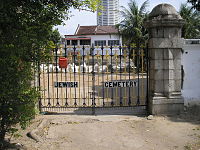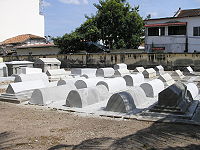| Revision as of 17:53, 18 July 2012 editBobk (talk | contribs)Autopatrolled, Extended confirmed users4,386 edits Reverted good faith edits by 118.100.81.9 (talk): How is that even relevant? (TW)← Previous edit | Revision as of 17:11, 1 September 2012 edit undo69.248.98.23 (talk)No edit summaryNext edit → | ||
| Line 10: | Line 10: | ||
| }} | }} | ||
| {{Jews and Judaism sidebar}} | {{Jews and Judaism sidebar}} | ||
| Malaysian Jews is a term used to refer to Jews living in ], or those originally from the country. A good number used to live openly in the state of ] until towards the end of the 1970s. They were also found elsewhere in the nation, especially in ] and ]. Malaysian Jews consists mainly of ] and ] Jewish descendents amongst the ] (Portuguese descent ]),<ref name="Kristang">{{cite web | url = http://kristang.bravehost.com/2.html | title = Kristang-Eurasian Jewish History | accessdate = 2011-02-22}}</ref><ref>{{cite journal | title = New Sources for the History of the Jewish Diaspora in Asia in the 16th Century | journal = The Jewish Quarterly Review | date = April 1950 | first = Walter | last = Fishchel | volume = 40 | issue = 4 | pages = 380| id = }}</ref> ] (the majority of whom are ]), India's ], with the rest being ] Jews and possibly ], who fled from ], China, during the ] in 1949.<ref name="Bhatt">{{cite web |url=http://www.penangstory.net.my/mino-content-paperhimanshu.html |title=The Jews of Penang |accessdate=27 June 2008 |author=Himanshu Bhatt |work=Fourth Colloquium of 'The Penang Story' |publisher= |date=2 February 2002 }}</ref> | Malaysian Jews is a term used to refer to Jews living in ], or those originally from the country. A good number used to live openly in the state of ] until towards the end of the 1970s. They were also found elsewhere in the nation, especially in ] and ]. Malaysian Jews consists mainly of ] and ] Jewish descendents amongst the ] (Portuguese descent ]),<ref name="Kristang">{{cite web | url = http://kristang.bravehost.com/2.html | title = Kristang-Eurasian Jewish History | accessdate = 2011-02-22}}</ref><ref>{{cite journal | title = New Sources for the History of the Jewish Diaspora in Asia in the 16th Century | journal = The Jewish Quarterly Review | date = April 1950 | first = Walter | last = Fishchel | volume = 40 | issue = 4 | pages = 380| id = }}</ref> ] (the majority of whom are ]), India's ], with the rest being ] Jews and possibly ], who fled from ], China, during the ] in 1949.<ref name="Bhatt">{{cite web |url=http://www.penangstory.net.my/mino-content-paperhimanshu.html |title=The Jews of Penang |accessdate=27 June 2008 |author=Himanshu Bhatt |work=Fourth Colloquium of 'The Penang Story' |publisher= |date=2 February 2002 }}</ref> | ||
| == History == | == History == | ||
Revision as of 17:11, 1 September 2012
Ethnic group
| Total population | |
|---|---|
| Unknown | |
| Regions with significant populations | |
| Kuala Lumpur, Malacca, Negeri Sembilan, Penang | |
| Languages | |
| English, Malay, Hebrew, Persian, Arabic, Portuguese, German | |
| Religion | |
| Judaism |
Malaysian Jews is a term used to refer to Jews living in Malaysia, or those originally from the country. A good number used to live openly in the state of Penang until towards the end of the 1970s. They were also found elsewhere in the nation, especially in Negri Sembilan and Malacca. Malaysian Jews consists mainly of Sephardic and Marrano Jewish descendents amongst the Kristang people (Portuguese descent Eurasians), Mizrahi Jews (the majority of whom are Baghdadi Jews), India's Cochin Jews, with the rest being Ashkenazi Jews and possibly Chinese Jews, who fled from Kaifeng, China, during the communist revolution in China in 1949.
History
The first contact between Jews and the inhabitants of Malaya (later part of Malaysia) goes back to the 9th century AD on the riverbanks of the Bujang Valley, and later well into the 18th Century AD in the cosmopolitan bazaars of Malacca. The presence of Sephardic Baghdadi Jews in Penang probably occurred at the turn of the 19th century as the fledgling British ruled entreport grew and attracted Jewish trading families like the Sassoons and Meyers from India. There was also significant emigration of Jews from the Ottoman province of Baghdad as a result of the persecutions of the governor, Daud Pasha, whose rule lasted from 1817 to 1831.
The first Baghdadi Jew known by name to have settled in Penang was Ezekiel Aaron Menasseh, who emigrated from Baghdad in 1895. Menasseh claimed to have been the only practicing Jew in Malaya for 30 years until after World War I, when a significant number of Baghdadi Jews began to settle in Malaya. Statistics from the same period showed a somewhat different picture :
| Year | Males | Females | Boys | Girls | Total |
|---|---|---|---|---|---|
| 1881 | 14 | 9 | 5 | 4 | 32 |
| 1891 | 47 | 64 | 14 | 30 | 155 |
| 1899 | 83 | 41 | 33 | 15 | 172 |
| 1901 | 16 | 17 | 8 | 4 | 45 |
| 1941 | 11 | 8 | 6 | 5 | 30 |
During the Japanese invasion of Malaya, the Penang Jewish community was evacuated to Singapore, and many were interred by the Japanese during the subsequent occupation of both Malaya and Singapore. After the war, a majority had emigrated to Singapore, Australia, Israel and the United States. By 1963, only 20 Penang Jewish families remained in the country.
Penang's only synagogue, located on 28, Nagore Road, closed down in 1976 as the community could no longer fulfill the minyan, a quorum of ten or more adult Jews assembled for purposes of fulfilling a public religious obligation.
Today, approximately 100 Jews who are refugees from Russia are said to reside in Malaysia,. The original Penang Jewish community has ceased to exist with the death of Mordecai (Mordy) David Mordecai on 15 July 2011. The rest of the Penang Jews have either embraced Christianity or else have emigrated to other countries, especially with the rise of anti-semitic sentiments and anti-Israel policies pursued by the Malaysian government since the 1970s.
Jahudi Road (or Jew Road) in Penang, where the majority of the Penang Jewish population stayed, has since been renamed Jalan Zainal Abidin, erasing another legacy of the Jewish presence in Malaysia. The only significant presence remaining is the Jewish cemetery and the old, disused synagogue.
Many of the descendants of the Penang Jews are mainly seen in Singapore (such as ex late Chief Minister David Marshall, a Baghdadi Jew). Many also reside in Australia, Canada, New Zealand, the United Kingdom, and the United States, especially in New York, but their numbers are unknown. The majority of Penang Jews spoke Malay and English, whilst the rest spoke mainly Yiddish, Persian, Hebrew and also Arabic.
Penang Jewish Cemetery
The Penang Jewish Cemetery, established in 1805, is believed to be the oldest single Jewish cemetery in the country. It forms a 38,087 square feet (3,538.4 m) cleaver shaped plot of land situated alongside Jalan Zainal Abidin (formerly Jahudi Road), a small link road located between Burmah and MacAlister Roads in George Town. The cemetery used to be a green lung, but much of the lawn has been cemented over.
The oldest Jewish tombstone is dated 9 July 1835 dedicated to a Mrs. Shoshan Levi and is believed to mark the grave of the English Jewess that was the benefactor who donated the land where the current cemetery stands. Most of the graves take the form of a triangular vaulted-lid casket, resembling ossuaries commonly found in Israel. There are approximately 107 graves located in the cemetery, with the most recent tombstone dated 2011, incidentally the grave of the last ethnic Jew on the island. It is the only cemetery established solely for the once small and thriving Jewish community in Peninsular Malaysia, although there may be a few Jewish graves in other non-Jewish cemeteries.
The graves of the Cohens are located separately from the main group of graves on the north-eastern corner of the cemetery and it includes the grave of Eliaho Hayeem Victor Cohen, a Lieutenant with the 9th Jat Regiment of the British Indian Army killed in an accident on 10 October 1941. It is the only grave in the cemetery that is maintained by the Commonwealth War Graves Commission. The cemetery is itself managed by a board of trustees established and registered in 1885.
Notable Malaysian Jews
- Gary Braut - primary Jewish contact in Malaysia
- Charles Ephraim – one of the last Penang born Jews
- Ezekiel Menasseh – the earliest verified Jewish resident in Penang.
- Edgar Pinto Xavier - Ambassador for the Secular Humanistic Jewish Movement in Malaysia & the Far East
Gallery
-

The entrance to the Penang Jewish Cemetery facing Jalan Zainal Abidin (formerly Jahudi Road) -

A view of the Penang Jewish Cemetery -

Tombstones at the Penang Jewish Cemetery -

Commemorative plaque indicating the year of establishment of the Penang Jewish Cemetery
See also
References
- ^ "Kristang-Eurasian Jewish History". Retrieved 22 February 2011.
- Fishchel, Walter (April 1950). "New Sources for the History of the Jewish Diaspora in Asia in the 16th Century". The Jewish Quarterly Review. 40 (4): 380.
- ^ Himanshu Bhatt (2 February 2002). "The Jews of Penang". Fourth Colloquium of 'The Penang Story'. Retrieved 27 June 2008.
- ^ Raimy Ché-Ross (April 2002). "A Penang Kaddish: The Jewish Cemetery in Georgetown – A case study of the Jewish Diaspora in Penang (1830s–1970s)" (Word Document). The Penang Story – International Conference 2002. Retrieved 28 June 2008.
{{cite journal}}: Cite has empty unknown parameter:|coauthors=(help); Cite journal requires|journal=(help) - ^ Cohen, Israel (1925). The Journal of a Jewish Traveller. London: John Lane & The Bodley Head Ltd.
{{cite book}}: Check|authorlink=value (help); Cite has empty unknown parameter:|coauthors=(help); External link in|authorlink= - Nathan, Ezekiel (1986). The History of Jews in Singapore (1830–1945). Singapore: Herbilu Editorial & Marketing Services. p. 173. ISBN 9971-84-429-X.
{{cite book}}: Cite has empty unknown parameter:|coauthors=(help) - "History". Jewish Welfare Board, Singapore. Archived from the original on 22 April 2008. Retrieved 27 June 2008.
- ^ "The Jewish Virtual History Tour – Malaysia". Jewish Virtual Library. The American-Israeli Cooperative Enterprise. Retrieved 27 June 2008.
- News Straits Times (Northern Edition) article on 18 July 2011 entitled: "Uncle Mordy laid to rest"
- Parfitt, Tudor (1987). The Jews of Africa and Asia: Contemporary Anti-Semitism and other pressures. Singapore: Minority Rights Group. pp. 9–10. ISBN 0-946690-56-1.
{{cite book}}: Cite has empty unknown parameter:|coauthors=(help) - "Humanistic & Secular Jews Build Communities and Congregations Worldwide". Retrieved 22 February 2011.
Literature
- Khoo Salma Nasution. More Than Merchants: A History of the German-speaking Community in Penang, 1800s–1940s. Areca Books. (2006). ISBN 978-983-42834-1-4 (pg. 33)
External links
![]() Media related to Jewish Cemetery, Penang at Wikimedia Commons
Media related to Jewish Cemetery, Penang at Wikimedia Commons
- Penang Jewish Cemetery: Last traces of an exodus community
- Jewish Exponent: Mythical Malaysia
- Yahoo Travel: Jewish Cemetery
- Jewish Photo Library - Former Penang Synagogue
- Jewish Photo Library - Penang Jewish Cemetery
- International Association of Jewish Genealogical Societies: Malaysia
| History of the Jews in Asia | |
|---|---|
| Sovereign states |
|
| States with limited recognition | |
| Dependencies and other territories | |